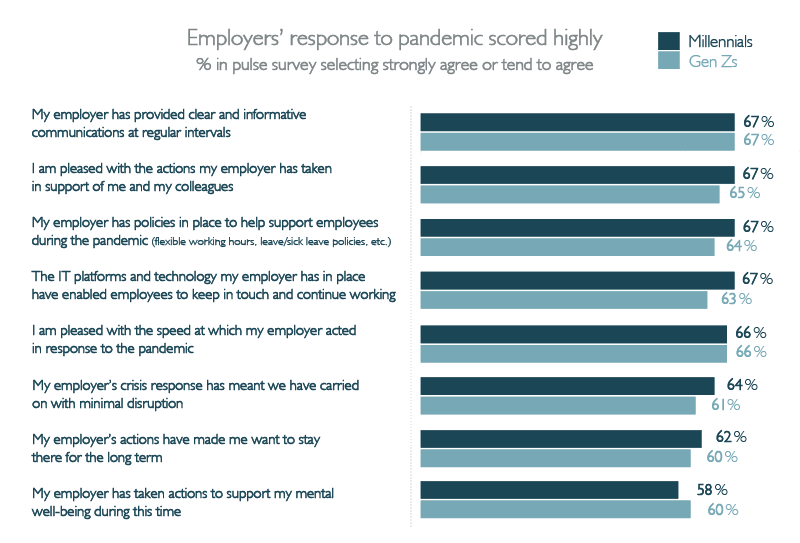The Deloitte Global Millennial Survey 2020: do millennials and Generation Z hold the key to creating a “better normal”?
The fieldwork for Deloitte’s 2020 Millennial Survey began in late November 2019. It ended in early January. A few weeks after that, it became apparent that the world was turning upside down.
A pulse survey was quickly developed. It was sent out in April and May to around half the number from the original survey – 5,501 millennials and 3,601 Gen Zs, compared to the 13,715 millennials and 4,711 Generation Z respondents first time round – to pull in data that would reflect what had suddenly become a very different world to the one at the end of 2019.
Both generations have been hit hard by the pandemic. Almost 30% of Gen Zs and a quarter of younger millennials (25–30 years old) in the second survey had either lost their jobs or were on temporary, unpaid leave. It would seem reasonable to expect the second survey to paint a considerably more negative picture than the first.
Yet that picture is actually considerably more mixed and complex than might be predicted – and in fact, more hopeful too.
Lockdown meant slow down
The first survey found quite a bit of uneasiness and pessimism amongst millennials and Gen Zs. Yet, surprisingly, in the second survey that figure fell. The percentage of millennials who said they were stressed all or most of the time dropped from 50% to 42% and for Gen Zs, it fell from 52% to 44%.

What should we make of that? The report suggests this might be one of the unexpected silver linings of the pandemic. All the disruption, the lockdown, being forced to stay at home more: for many, that meant life had to slow down. More time was being spent with immediate family. The stressful commute wasn’t being done day in, day out. Technology was helping people feel less isolated than might otherwise have been the case. The slower pace of life, combined with the benefits of tech, meant people were actually connecting in new and more sustainable ways.
Read more: The most popular employee benefit just got fast-tracked 20 years
Of course, significant worries remain. Family welfare tops the list of sources of anxiety (41% for both groups) along with the longer term financial future (41% of millennials and 43% of Gen Z) and career and job prospects (40% for millennials and 46% for Gen Z).

These generations do however appear more willing to acknowledge stress as a problem and to acknowledge the importance of mental health. There are still challenges to overcome though. In the first survey, just 44% of millennials and 38% of Gen Z were willing to admit to their employers that they were absent from work because of stress or anxiety issues. Given the effects of stress and anxiety on performance and engagement, it’s worth employers giving this some attention.
Could the pandemic trigger meaningful environmental change?
In the first survey, 83% of millennials and 79% of Gen Zs supported the view that climate change is happening, and is mainly as a result of human activity. Around half of respondents believed it was too late to repair the damage. So it was interesting to see an overall rise in optimism during the second pulse survey. For example, there was a reduction in the number of respondents agreeing with the statement “We have already hit the point of no return, and it is too late to repair the damage”.

It could be that the first survey revealed the frustration created by a society which, for all of the right environmental rhetoric, didn’t actually seem capable of doing anything significantly different. There was perhaps some tweaking at the edges but true transformation was not being accomplished to any meaningful extent.
It’s possible the immediate environmental consequences of the pandemic, including falling emissions and pollution levels, offered renewed hope that some recovery is still possible. Pre-pandemic, there may have been a feeling that nothing was really going to change to the extent it needed to – and the shake up created by the pandemic has created an unexpected moment of opportunity.
What does the survey tell us about loyalty to employers?
The picture before the pandemic was one that suggested job loyalty was rising. This was possibly partly due to greater employer focus on issues like diversity and inclusion, and taking a more responsible approach towards their impact on local communities.
For the first time since 2016 (when the question was introduced) a greater number of millennials wanted to stay with their employers for at least five years (35%) than leave within two years (31%). While Gen Zers were more likely to seek to move within two years, the figure had fallen to half from last year’s 61%.

Even though “reducing its impact on the environment” was not at the top of the list of areas where employers were doing very or fairly well, it was interesting that this number was 22% higher for those intending to stay in their jobs for five or more years – suggesting a responsible attitude towards the environment could positively affect loyalty levels.
How has the employer response to the pandemic been received?
Overall, employers have fared quite well in terms of how their pandemic responses have been viewed.
More than six out of 10 respondents felt their employers’ actions have encouraged them to want to stay with them longer term. Two thirds of millennials and Gen Zs were happy at the speed employers responded and how well they were supported. About 60% in total said their employers took actions to support their mental wellbeing. Around two thirds felt the technology infrastructure had worked for them and that their employers had supportive policies in place during the pandemic.

Longer term, it seems the pandemic experience has increased the desire to work remotely, with around 3 out of every 5 employees wanting the option to work that way more often and expressing a preference to use technology rather than travelling for work. As the report comments, this offers a clear sign that cloud-enabled collaboration tools are delivering on the promise to efficiently connect people globally and reduce their impact on the environment.
Values have not been compromised by the pandemic
A generally positive view of their own employers, however, did not equate to positive opinions about the world of business as a whole. Just a third of respondents in the first survey said business leaders are having a positive impact on them and the world around them. In the second survey, less than half of respondents (41% of millennials and 43% of Gen Zs) felt business globally was having a positive impact on wider society.
One in four millennials actively avoid companies because of the pay and rewards given to senior executives relative to average employees. Income equality is just one indicator of their expectations for fairness in society. There’s a strengthened sense of community and awareness of the importance of supporting one another – around 75% of respondents said the pandemic had made them more sympathetic towards others’ needs. Both generations are trying to make more effort to actively support smaller, local businesses. Four out of ten millennials have already initiated or deepened relationships with businesses whose products and services have a positive impact on the environment.
A change for the better?
There are clearly many concerns on the minds of millennials and Generation Zers yet it’s encouraging to see so many positive signs too. Even before the pandemic, these generations had already grown up with an awareness of difficult days ahead due to concerns like the climate emergency. Could that have made these generations better equipped to deal with the outcomes of this pandemic? Far from the sense of “self-entitlement” that they have sometimes been accused of, might it be that from an early stage, they have become accustomed to asking questions and searching for better ways to live? Could it be that the pandemic might actually be reinforcing the hunger for positive change?
While it’s early days, there are certainly hopeful signs that might be the case. Society has been shaken up and this survey might have captured the early indications of two generations that are determined to find the opportunities to make a change for the better.
Further reading: How do you show your people they matter? From small gestures to professional opportunities, here’s a list of our favorite employee recognition ideas.


 The value of external feedback in the workplace
The value of external feedback in the workplace
 Expand the power of recognition with Partner Appreciation
Expand the power of recognition with Partner Appreciation
 11 fascinating social work theories
11 fascinating social work theories